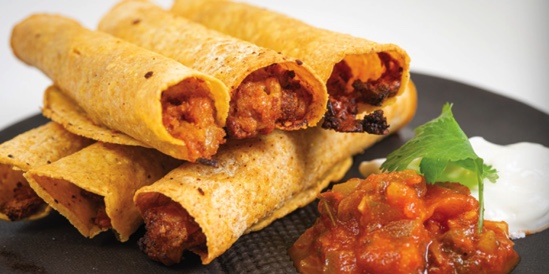Powered by Plants: The Prairie Plant Protein Project
Products featuring plant-based proteins continue to pop up on grocery shelves everywhere – from cashew-based, non-dairy cheese to a plethora of plant-based beverages to jackfruit jerky and much more. The market for plant-based food products is growing and the Prairie Research Kitchen is at the pulse of new innovations.
The Prairies are home to an abundance of pulses – creating a rich opportunity for research centred on new ingredient applications and product developments. Over the past two years, the Prairie Research Kitchen, in collaboration with local and national partners, has continued to pave the way for pulses as the star ingredient in plant-based food products.
The Prairie Research Kitchen (PRK) collaborated with the University of Manitoba’s Department of Food and Human Nutritional Sciences, as well as the ARD-Food Development Centre (ARD-FDC) – in partnership with funding from the Manitoba Pulse & Soybean Growers (MPSG), Canadian Agricultural Partnership (CAP) and Ag Action Manitoba – to research new, innovative applications for Prairie plant proteins, including a variety of pulses, soybeans, and hemp.
The primary goal of the research project, entitled: Development of value-added food platform technologies using plant-based protein sources including bean, soy and hemp (The Prairie Plant Protein Project), was to discover novel plant-protein sources that function as protein extenders or replacers.
Project objectives also included fostering partnerships to integrate applied and culinary research into Manitoba’s research network; demonstrating new plant-based protein options for Canadian consumers, sourced from Manitoba and throughout the country; and helping increase and diversify the range of foods Canadians eat, highlighting the versatility of plant-protein sources.
The first phase of the Prairie Plant Protein Project involved assessing the macro-nutrients, specifically the proteins present, at the University of Manitoba’s Food and Human Nutritional Sciences lab. Outcomes indicated that fava beans had a good profile for making tofu, which helped shape the focus on the protein blends developed throughout the course of the project.
Next, researchers at ARD-FDC extracted the proteins from the Prairie pulses, coagulating them to form curds. The curds were then formed into tofu-like blocks. The intent for the new-style, or “nouveau tofu” was to incorporate into various food product applications to replace animal ingredients, or to complement and/or increase nutritional value.
The novel plant protein sources were tested to determine their unique nutritional profiles, with the end goal of combining amino acids from pulses, soybeans, and hemp to create complete protein sources.
Testing was completed to validate the increase in nutritional profiles of combining plant-protein sources, for example, soy-hemp tofu.
After developing several varieties of nouveau tofu, including a new take on traditional soy tofu, Prairie Research Kitchen’s chefs transformed the Prairie plant protein sources into food applications.
The culmination of research and culinary art comes together in a cookbook, Pulse of the Prairies: A Culinary Celebration of Manitoba’s Plant Proteins. Throughout the cookbook’s pages, you’ll see recipes such as Smoky Red Pepper Non-Dairy Cheese made from fava hemp tofu and Tofu Taquitos (see recipe below) made from dehydrated and reconstituted fava hemp soy tofu. In addition to nouveau tofu, the cookbook also features recipes made from navy bean plant-based milk and okara, the starchy by-product of coagulating the plant proteins into curds.
The Pulse of the Prairies cookbook highlights the exceptional nature of resources, crops, and food ingredients combined with the skills and expertise of our province’s research community, demonstrating exciting opportunities for Manitoba plant proteins. Overall, the project helped build platforms for knowledge and technology to showcase how plant-based protein can be used in food systems in Manitoba, nation-wide, and beyond. Manitoba pulses are functional ingredients that can be used to meet growing consumer trends – our Manitoba research network and the Prairie Research Kitchen can help businesses apply and integrate plant-based proteins.
– Heather Hill, Research Manager, Prairie Research Kitchen

Tofu Taquito Recipe
Tofu Taquitos
Yield: 6 taquitos
| Ingredient | Mass | Volume |
| DEHYDRATED FAVA HEMP SOY TOFU | ||
| Fava Hemp Soy Tofu, firm | 454 g | 1 pound |
| TOFU TAQUITOS | ||
| Fava Hemp Soy Tofu, dehydrated crumbles | 35 g | 1/2 cup |
| Water, hot (95°C) | 60 g | 1/4 cup |
| Canola oil | 5 g | 1 tsp |
| Onion, minced | 12 g | 1 tbsp |
| Garlic, minced | 5 g | 1 tsp |
| Cumin | 2.5 g | 1/2 tsp |
| Paprika | 1.25 g | 1/4 tsp |
| Coriander | 1.25 g | 1/4 tsp |
| Chipotle pepper, minced | 25 g | 1 whole |
| Adobo sauce | 10 g | 2 tsp |
| Salt | 3.5 g | 1/2 tsp |
| Mozzarella, grated | 60 g | 1/2 cup |
| Corn tortillas | 6 |
Method
Dehydrated Tofu:
- Freeze tofu until solid.
- Thaw tofu and drain off all excess water.
- Crumble tofu into pea-sized crumbles. Using a dehydrator, dehydrate crumbles at 63 C/145 F for 10-12 hours until crumbles are completely dry.
- Store in an airtight container.
Tofu Taquito:
- In a small bowl, add hot (simmering) water to dehydrated tofu crumbles, cover with plastic wrap, and allow to sit for 5 minutes.
- In a separate small bowl, combine all seasonings and spices.
- In a sauté pan over medium heat, add oil. Once oil is hot, add onion and sauté for 1 minute. Add garlic, seasoning mix, chopped chipotle and adobo sauce. Sauté for 1 more minute and then add hydrated tofu.
- Sauté tofu mixture for 1-2 minutes until hot and just starting to get brown, crispy edges. Adjust seasoning as desired.
- Remove from heat and pour mixture into a bowl to cool for 5-10 minutes. It should be cool enough that the cheese does not melt when you mix it in.
- Add grated mozzarella to slightly cooled tofu mixture and stir until well combined. You may want to add 1-2 tsp of water to moisten mixture. You should be able to form it with your hand, so it doesn’t fall out of the shell during the filling/rolling step.
- Heat oven to 400 F. Using a non-stick skillet, over high heat, add 1-2 tsp of oil. Once oil is hot, gently lay in 1 corn tortilla for about 5 seconds, and then flip, swirling to coat the tortilla with the hot oil. This helps to soften the tortilla for easier rolling as well as crisping up during the baking process. You may need to add more oil as it coats the shells.
- Carefully remove the tortilla and add 1/6 of the filling (or desired amount) to the bottom third of the tortilla. Tightly roll up the taquito and place on a parchment-lined sheet pan, seal side down. You may need to use a toothpick to seal if the taquito rolls open on its own.
- Repeat until all the filling is used up.
- Bake for 10-12 minutes until edges are crispy and cheese is melty. Serve with sour cream and fresh salsa.
Note: Adjust the amount of cheese as desired. For added flavour, bulk, and nutrition, add minced green peppers and mushrooms to your sauté mix before filling!
This is a great option that will be loved by both meat-eaters and vegetarians alike.
To request a copy of The Pulse of the Prairies: A Culinary Celebration of Manitoba’s Plant Proteins cookbook please contact the Prairie Research Kitchen.

